The following outline is provided as an overview of and topical guide to automation:
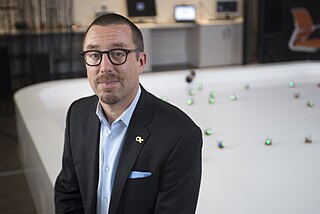
Magnus B. Egerstedt is a Swedish-American roboticist who is the Dean of the Henry Samueli School of Engineering at the University of California, Irvine. He was formerly the Steve C. Chaddick School Chair and Professor at the School of Electrical and Computer Engineering, Georgia Institute of Technology.
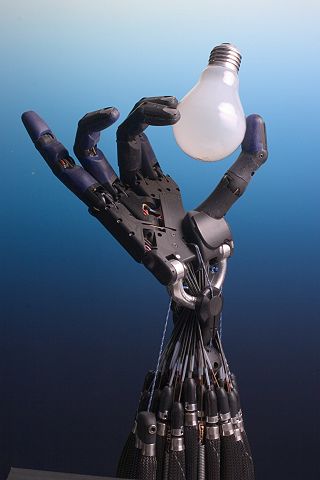
Robotics is the interdisciplinary study and practice of the design, construction, operation, and use of robots.
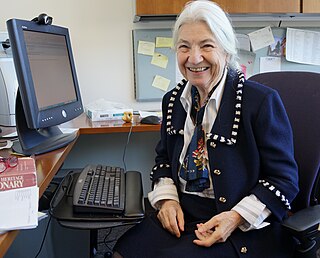
Ruzena Bajcsy is an American engineer and computer scientist who specializes in robotics. She is professor of electrical engineering and computer sciences at the University of California, Berkeley, where she is also director emerita of CITRIS.
The IEEE Robotics and Automation Society is a professional society of the IEEE that supports the development and the exchange of scientific knowledge in the fields of robotics and automation, including applied and theoretical issues.
The following outline is provided as an overview of and topical guide to robotics:
Maja Matarić is an American computer scientist, roboticist and AI researcher, and the Chan Soon-Shiong Distinguished Professor of Computer Science, Neuroscience, and Pediatrics at the University of Southern California. She is known for her work in human-robot interaction for socially assistive robotics, a new field she pioneered, which focuses on creating robots capable of providing personalized therapy and care that helps people help themselves, through social rather than physical interaction. Her work has focused on aiding special needs populations including the elderly, stroke patients, and children with autism, and has been deployed and evaluated in hospitals, therapy centers, schools, and homes. She is also known for her earlier work on robot learning from demonstration, swarm robotics, robot teams, and robot navigation.

Bio-inspired robotic locomotion is a fairly new subcategory of bio-inspired design. It is about learning concepts from nature and applying them to the design of real-world engineered systems. More specifically, this field is about making robots that are inspired by biological systems, including Biomimicry. Biomimicry is copying from nature while bio-inspired design is learning from nature and making a mechanism that is simpler and more effective than the system observed in nature. Biomimicry has led to the development of a different branch of robotics called soft robotics. The biological systems have been optimized for specific tasks according to their habitat. However, they are multifunctional and are not designed for only one specific functionality. Bio-inspired robotics is about studying biological systems, and looking for the mechanisms that may solve a problem in the engineering field. The designer should then try to simplify and enhance that mechanism for the specific task of interest. Bio-inspired roboticists are usually interested in biosensors, bioactuators, or biomaterials. Most of the robots have some type of locomotion system. Thus, in this article different modes of animal locomotion and few examples of the corresponding bio-inspired robots are introduced.

Raffaello D’Andrea is a Canadian-Italian-Swiss engineer, artist, and entrepreneur. He is professor of dynamic systems and control at ETH Zurich. He is a co-founder of Kiva Systems, and the founder of Verity, an innovator in autonomous drones. He was the faculty advisor and system architect of the Cornell Robot Soccer Team, four time world champions at the annual RoboCup competition. He is a new media artist, whose work includes The Table, the Robotic Chair, and Flight Assembled Architecture. In 2013, D’Andrea co-founded ROBO Global, which launched the world's first exchange traded fund focused entirely on the theme of robotics and AI. ROBO Global was acquired by VettaFi in 2023.
Automation engineering is the provision of automated solutions to physical activities and industries.
BionicKangaroo is a robot model developed and made by Festo in the form of a kangaroo. Applying methods from kinematics, bionics, and biomimetics, Festo's researchers and engineers studied the way kangaroos move, and applied that to the design of a robot that moves in a similar way. The robot saves energy from each jump and applies it to its next jump, much as a real kangaroo does.

Rethink Robotics is a robotics company co-founded by Rodney Brooks and Ann Whittaker in 2008. In 2018 the assets of Rethink Robotics were bought by the German automation specialist HAHN Group. In 2021 Rethink Robotics joined the United Robotics Group GmbH.
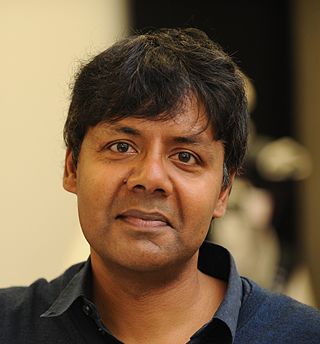
Sethu Vijayakumar FRSE is Professor of Robotics at the University of Edinburgh and a judge on the BBC2 show Robot Wars. He is the Programme co-Director for Artificial Intelligence at The Alan Turing Institute, the UK's National Institute for Data Science and Artificial Intelligence, with the responsibility for defining and driving the institute's Robotics and Autonomous Systems agenda. He co-founded the Edinburgh Centre for Robotics in 2015 and was instrumental in bringing the first NASA Valkyrie humanoid robot out of the United States of America, and to Europe, where is it a focus of research at the School of Informatics. He was elected as a Fellow of the Royal Society of Edinburgh in 2013.

Antonio Bicchi is an Italian scientist interested in robotics and intelligent machines. He is professor at the University of Pisa and senior researcher at Istituto Italiano di Tecnologia in Genoa. He is an adjunct professor at the School of Biological and Health Systems Engineering of Arizona State University in Tempe, Arizona, US.
Learning factories represent a realistic manufacturing environment for education, training, and research. In the last decades, numerous learning factories have been built in academia and industry.
Davide Scaramuzza is an Italian professor of robotics at the University of Zurich, specialising on micro air vehicles.
The Thai-German Institute (TGI) is a not-for-profit entity under the Foundation for Industrial Development (FID), which itself falls under the Ministry of Industry (Thailand). The aim of the organization is to act as a training center for transferring advanced manufacturing technology to the Thai industry.
Ryan Gariepy is a Canadian engineer, roboticist, and technology entrepreneur. He co-founded Clearpath Robotics with Matt Rendall, Bryan Webb, and Patrick Martinson in 2009, and subsidiary OTTO Motors in 2015. Gariepy currently serves as the Chief Technology Officer of both Clearpath Robotics and OTTO Motors, and as a founding board member of Open Robotics. He is named on over 40 patents and patents pending in the field of intelligent systems.

Auke Jan Ijspeert is a Swiss-Dutch roboticist and neuroscientist. He is a professor of biorobotics in the Institute of Bioengineering at EPFL, École Polytechnique Fédérale de Lausanne, and the head of the Biorobotics Laboratory at the School of Engineering.
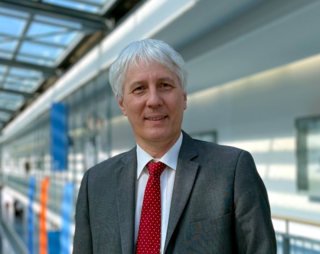
Alois Christian Knoll is German computer scientist and professor at the TUM School of Computation, Information and Technology at the Technical University of Munich (TUM). He is head of the Chair of Robotics, Artificial Intelligence and Embedded Systems.









